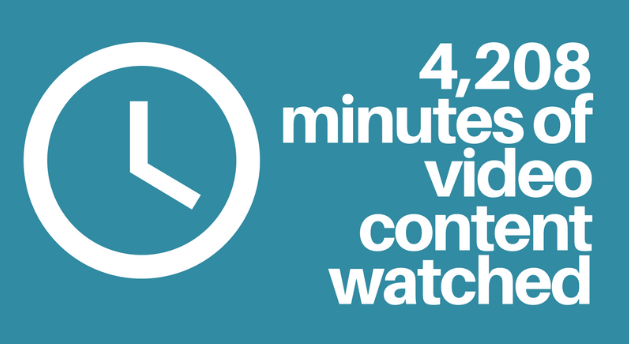Welcome to the 23 Research Things Cambridge blog! For those of you who haven’t been here before, 23 Research Things ran for the first time in Cambridge between October and December 2016 and we had lots of lovely people taking part with their blogs, video views, comments and much more.
So, we’ve taken a look at all the stats that everyone generated and combined them with all the lovely feedback and other data that we got from participants and put it all into a snazzy report. If you want to read the whole report, which includes details on how the programme was developed, check it out here.
For everyone else, here are some of the more interesting facts!

October 2016 saw the highest views and visits with 5,008 and 1,289 respectively. Of those views, 84% came from within the UK with the remaining 16% of views spread across the globe with views coming from as far away as Japan. In fact, every continent was found to be represented in the blog stats, except for Antarctica. We’re not sure if WordPress collects statistics in Antarctica. It might be too cold.
November 2016 started to reflect the fact that the programme had been running for some time and so the statistics had started to reduce into more steady totals after the initial excitement surrounding the start of the programme had calmed. Views during this month were 1,890 with 387 visitors. Again, many views came from a wide range of countries with the UK taking the largest share of 88%. Facebook didn’t appear as a top referrer this time but Twitter, search engines, University websites and WordPress services continued to be strong.
December 2016 marked the winding down of the programme as the final Thing was uploaded on 5 December in time for the end of the academic term. Again this is reflected in the blog statistics with 865 views and 206 visitors. The UK still featured prominently in the view statistics at 74% with the rest coming from a range of countries. Twitter still dominated as a top referrer with search engines and University of Cambridge websites continuing to play a big role.

The top 3 viewed videos were:
- About the programme – 334 views
- Introduction to the programme -161 views
- Reflective blogging – 115 views

We asked participants a few questions about how they found the programme. 45% thought our videos were excellent (thanks!) and apparently we got the length of the videos just right. We’re sorry that some of you found the sound levels a bit quiet on some of the videos, this was mostly down to the room we used for filming but we’ll be sure to try and avoid this with future videos.

People liked our blog posts which is nice to hear, but they weren’t as convinced about blogging themselves. Blogging about the programme proved to be like Marmite, either you love it or you hate it. 50% of participants were positive about blogging while 50% were ambivalent or didn’t like it. Someone even suggested that the blogging bit be stopped when the programme runs again.
The thing is, and we go into detail on this in the report, blogging is there as a tool which serves many purposes. It helps participants reflect on each Thing but it also helps us assess people’s work and engagement with the programme. If you have any ideas of how this could be done differently, we’d love to hear from you.
Favourite things and no so favourite things
People really like the Things to do with images as Creative Commons, presentation skills and finding good images were hailed as being really good Things to know.
LinkedIn and Twitter weren’t so popular and people wanted more info on things like GitHub and Text & Data Mining. We deliberately kept those videos light because each topic is pretty big and could be a day long session in their own right.
One person did not like the Communicating Complex Ideas theme as they did not see it ‘as much of an issue in Cambridge’. This Thing was deliberately included precisely because it is an issue and the central External Communications team work extensively across the University to train researchers up and equip them with the skills to communicate their work effectively. In addition, this area of communication is becoming more and more pressing as issues such as impact become more essential in assessment exercises such as the next REF. So while this participant did not view it as an issue, it certainly is something that people are working on helping University of Cambridge researchers be better at overall.
Final feedback
One thing that came up a few times was that there was a lot to do in a short space of time. We made this programme intensive so participants could get as much info as possible at the start of their studies or research and then they could go off and explore these new ideas in their own time. But we know. It was still pretty intensive. There isn’t really a perfect time to run a course like this as everyone is always busy but we tried to time it as close to a quiet bit of term as possible so it wasn’t when everyone had projects due or exams looming.
That being said, everything from the programme will stay online. So it’ll still be here and on our YouTube channel for you to explore as much or as little as you want. So go. Enjoy!
Thanks to everyone who took part and/or helped with the 2016 running of this programme and we look forward to seeing what we can offer you next!
Until next time…bye!
Georgina


Some impressive stats there!
LikeLike
Thanks!
LikeLike
Will you be running the program again or is the material left online such that anyone can run through the program in their own time frame?
Thanks!
LikeLike
Hi Katie,
Yes, as we’ve said in the post and elsewhere on this blog that everything will stay up indefinitely for people to work through in their own time frame. We will probably run the programme again in the future but we’ll inevitably do it a bit differently and won’t erase the old version. Hope that makes sense!
Georgina
LikeLike
I was one of those who started but didn’t finish – but I have every intention of coming back to it. Don’t suppose you’d consider re-running it again (maybe over the summer, when life is less hectic) for those of us who need to catch up?
LikeLike
By the way – I thought it was great, which is why I want to come back and finish it!
LikeLike
Thanks! Like I said, it isn’t going anywhere! 🙂
LikeLike
Hi! I remember checking your blog! Everything will be left online indefinitely so you can work through it whenever you want to really, whether now or over summer. When we do rerun it, still need to work out when that will be as it is a lot of working putting this sort of thing together, it’ll probably be in term time to be fair to current students.
LikeLike
Reblogged this on Chemistry Library blog and commented:
Fascinating reading!
LikeLike
Looking forward to seeing what 2017 will be.
Keep up the good work!
LikeLike